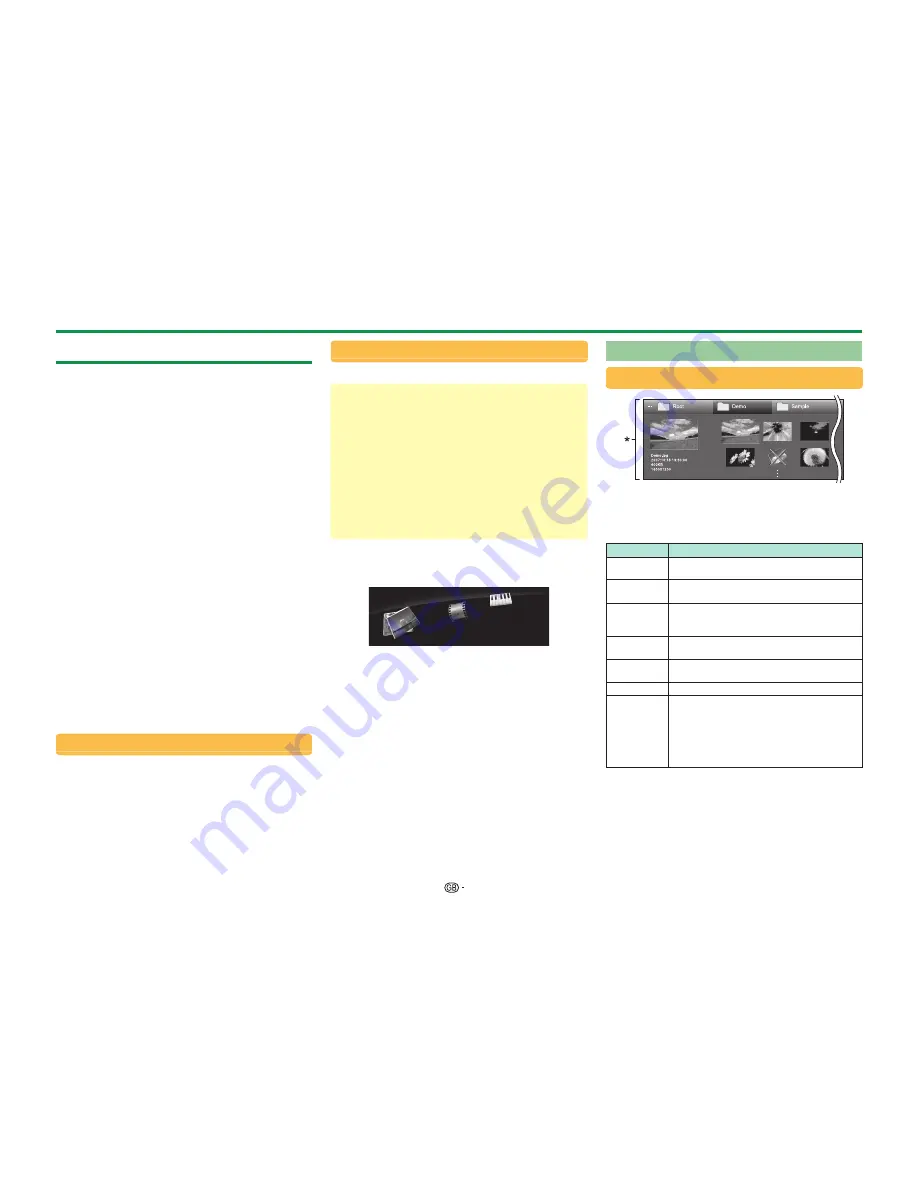
48
USB media/Home network
USB media/Home network
In both modes, you can enjoy viewing photos,
listening to music and watching videos from external
USB devices (USB Memory, USB card reader (Mass
Storage Class), USB HDD) or Home network server.
NOTE
• To connect a Home network server, refer to
Network
setup
(Page 57).
• This function may not work properly for some USB
storage devices.
• The corresponding file format is different between “USB
media” and “Home network”.
• “Wide mode” is fixed during “Photo mode”. During
“Video mode”, you can select “Auto” or “Original”.
• Depending on the Home network server, the TV may not
be able to recognise the contained data.
• Use only alphanumeric characters for naming files.
• Do not disconnect a Home network server from the TV
while transferring files, using the slide show function,
when a screen is switching to another or before you exit
“Home network” from the “HOME” or “INPUT” menu.
• Do not connect and disconnect a Home network server
from the TV repeatedly.
• Depending on the USB device, the TV may not be able
to recognise the contained data.
• Use only alphanumeric characters for naming files.
• File names over 80 characters (may vary depending on
the character set) may not be displayed.
• Do not disconnect a USB device or memory card from
the TV while transferring files, using the slide show
function, when a screen is switching to another or
before you exit “USB media” from the “INPUT” menu.
Selecting the mode
Common operation
Select “USB media” or “Home network” from the
“HOME” or “INPUT” menu to enter this mode.
Selecting modes and drives/servers
1
Press
B
.
When the USB media menu is displayed
1
Press
a/b
to select “Select USB drive”, and then
press
;
.
• The available selections are “Select USB drive”
and “Folder display setting”.
2
Press
a/b/c/d
to select the USB device where
you want to find your files, and then press
;
.
• You can select from “All” or “Folder” for the type
of folder directory in “Folder display setting”.
When the Home network menu is displayed
Press
a/b
to select the Home network server where
you want to find your files, and then press
;
.
• Press
Y
to search for servers.
2
Press
c/d
to select among “Photo mode”,
“Music mode” or “Video mode”, and then press
;
.
Photo mode
Video mode
Music mode
NOTE
• The explanations for the buttons that can be used in
each mode are the explanations when using USB media
mode. Some operations may differ in Home network
mode. Follow the guide display during operations.
• You do not need to select the drive/server in step 1
when there is only one drive in the connected USB
device or there is only one Home network server
connected to the TV.
• 16 is the maximum number of drives that can be
displayed in USB media mode.
• 10 is the maximum number of servers that can be
displayed in Home network mode.
• You cannot enter these modes when there is no server
connected to the TV in Home network mode.
Photo mode
Viewing thumbnails
* This screen image is for the USB media mode. It
may be slightly different in the Home network mode.
Buttons for thumbnail operations
(When using USB media mode)
Buttons
Description
;
When selecting a folder icon: Enter this directory.
When selecting a photo thumbnail: Enlarge the photo.
a/b/c/d
(Cursor)
Select a desired item.
6
All*: Return to the previous screen.
Folder*: Return to the upper folder. When the top
folder is displayed, return to the top menu screen.
R button
Select/deselect items (
✔
mark appears on the
selected items).
G button
All*: Select BGM for the slide show.
Folder*: Move to the top menu screen.
Y button
Start the slide show.
B button
Display “USB media menu”.
• 3D display
• Select slide show interval
• Select slide show BGM
• Set all slide show image
• Reset all slide show image
• USB device removal
* The mode selected in “Folder display setting”
NOTE
• When there are invalid photo files, the
g
mark will be
displayed for the file.
• The 3D mode icon appears on the thumbnails of 3D
images. If you do not switch to 3D mode for the 3D
images, they will be displayed in 2D.
• You can see the file name, shooting date, file size and
pixel size of the selected photo on the left of the screen
(shooting date is only available in the EXIF file format).
Other useful features
















































